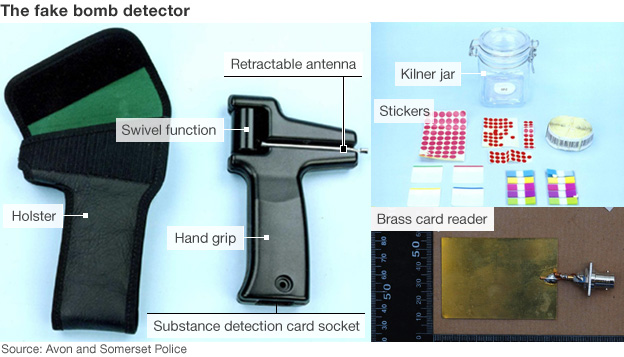Back in 2010, I said “There should be a special hell for this scam artist” who mocked up bomb detector kits and sold them for thousands of dollars in Iraq and other areas with a real need for protection against IEDs. It’s taken more than three years, but he’s finally been found guilty:
A Somerset-based businessman has been convicted of three counts of fraud over the sale of bogus bomb detectors after his operation was exposed in a BBC Newsnight investigation in 2010.
This was a scam of global dimensions. James McCormick marketed his fake bomb detectors around the world, selling them in Georgia, Romania, Niger, Thailand, Saudi Arabia and beyond.
But his main market was Iraq, where lives depended on bomb detection and where the bogus devices were, and still are, used at virtually every checkpoint in the capital.
Between 2008 and 2009 alone, more than 1,000 Iraqis were killed in explosions in Baghdad.

How the device was meant to work:
- A small amount of the substance the user wished to detect — such as explosives — was put in a Kilner jar along with a sticker that was intended to absorb the “vapours” of the substance
- The sticker was then placed on a credit-card sized card, which was read by a card reader and inserted into the device
- The user would then hold the device, which had no working electronics, and the swivelling antenna was meant to indicate the location of the sought substance
In other words, a magical dowsing stick that depended on the user to “detect” whatever the device was supposedly seeking. This wasn’t a case of a device that didn’t do what it was designed to do: it was a deliberate fraud with just enough “technological” mumbo-jumbo to appear to be a solution to a real problem:
The court heard that McCormick began his business by buying a batch of novelty “golf ball detectors” from the USA for less than $20 each. In fact they were simply radio aerials, attached by a hinge to a handle. He put the labels of his company, ATSC, on them and sold them as bomb detectors for $5,000 each.
He then made a more advanced-looking version which he was to sell for up to $55,000. The ADE-651 came with cards which he claimed were “programmed” to detect everything from explosives to ivory and even $100 bills. Police say the only genuine part of the kit — and the most expensive — was the carrying case.
To their credit, the police moved to investigate the same day the BBC’s original story broke. Strategy Page explained why the scam had been so easy to sell. Later it was reported that British civil servants and military personnel had been implicated in the fraud.




